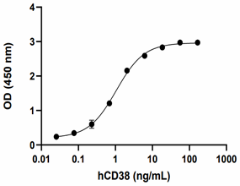- Regulatory Status
- RUO
- Other Names
- CD38, T10, CD38 antigen (p45), CD38 antigen, CD38 molecule, cluster of differentiation 38, Cyclic ADP-ribose hydrolase 1, CyclicADP-ribose Hydrolase, NAD(+) nucleosidase
- Ave. Rating
- Submit a Review

| Cat # | Size | Price | Save |
|---|---|---|---|
| 568104 | 25 µg | ¥74,630 | |
| 568106 | 100 µg | ¥146,270 |
CD38 is a 45 kD type II transmembrane glycoprotein also known as T10. It is an ADP-ribosyl hydrolase expressed at variable levels on hematopoietic cells and in some non-hematopoietic tissues (such as brain, muscle, and kidney). In humans, it is expressed at high levels on plasma cells and activated T and B cells, natural killer (NK) lymphocytes, myeloblasts, and erythroblasts. By functioning as both a cyclase and a hydrolase, CD38 mediates lymphocyte activation, adhesion, and the metabolism of cADPR and NAADP. CD31 is the ligand of CD38. ADP-ribosyl cyclase is able to transform NAD(P)+ into three different products with calcium mobilizing ability, cyclic ADP-ribose, NAADP+, and ADP-ribose.
Product DetailsProduct Details
- Source
- Biotinylated recombinant human CD38, amino acid Val 43 - Ile 300 (Accession No.NP_001766.2), with a C-terminal Avi-6His tag, was expressed in CHO cells. Human CD38-Avi tag was site-specifically biotinylated by enzyme BirA.
- Molecular Mass
- The 294 amino acid recombinant protein has a predicted molecular mass of approximately 33.5 kD. The DTT-reduced and non-reduced protein migrates at approximately 35 – 50 kD by SDS-PAGE. The predicted N-terminal amino acid is Val.
- Purity
- > 95%, as determined by Coomassie stained SDS-PAGE.
- Formulation
- 0.22 µm filtered protein solution is in PBS, pH7.2.
- Endotoxin Level
- Less than 0.1 EU per µg of protein as determined by the LAL method.
- Concentration
- 25 µg size is bottled at 200 µg/mL. 100 µg size and larger sizes are lot-specific and bottled at the concentration indicated on the vial. To obtain lot-specific concentration and expiration, please enter the lot number in our Certificate of Analysis online tool.
- Storage & Handling
- Unopened vial can be stored between 2°C and 8°C for up to 2 weeks, at -20°C for up to six months, or at -70°C or colder until the expiration date. For maximum results, quick spin the vial prior to opening. The protein can be aliquoted and stored at -20°C or colder. Stock solutions can also be prepared at 50 - 100 µg/mL in appropriate sterile buffer, carrier protein such as 0.2 - 1% BSA or HSA can be added when preparing the stock solution. Aliquots can be stored between 2°C and 8°C for up to one week and stored at -20°C or colder for up to 3 months. Avoid repeated freeze/thaw cycles.
- Activity
- Immobilized purified anti-human CD38 antibody at 1 µg/mL binds recombinant human CD38 in a dose-dependent manner. HRP avidin (Cat. No. 405103) was used to detect the binding. The ED50 for this effect is 0.7 – 4.2 ng/mL.
- Application
-
Bioassay
- Application Notes
-
BioLegend carrier-free recombinant proteins provided in liquid format are shipped on blue-ice. Our comparison testing data indicates that when handled and stored as recommended, the liquid format has equal or better stability and shelf-life compared to commercially available lyophilized proteins after reconstitution. Our liquid proteins are validated in-house to maintain activity after shipping on blue ice and are backed by our 100% satisfaction guarantee. If you have any concerns, contact us at tech@biolegend.com.
Antigen Details
- Structure
- ADP-ribosyl cyclase, ectoenzyme, type II glycoprotein, 45 kD
- Distribution
-
T cells, B cells, NK-cells, myeloid, plasma, and dendritic cells
- Function
- Ecto-ADP-ribosyl cyclase, calcium signaling, cell activation
- Interaction
- NK cells, Neutrophils, Macrophages
- Ligand/Receptor
- CD31, hyaluronic acid
- Bioactivity
- Measured by its ability to bind CD38 antibody
- Cell Type
- B cells, Dendritic cells, NK cells, Plasma cells, T cells
- Biology Area
- Cell Adhesion, Cell Biology, Immunology
- Molecular Family
- Adhesion Molecules, CD Molecules
- Antigen References
-
- Gunawan M, et al. 2017. Sci Rep. 7:16642.
- Martin JC, et al. 2020. Cell. 178:1493.
- Del Alcazar D, et al 2019. Cell Rep. 28:3047-3060.e7.
- Kennedy-Darling J, et al. 2021. Eur J Immunol. 51:1262-1277.
- Cole C, et al. 2018. Nucleic Acids Res. 46:e62.
- Lavin Y, et al. 2017. Cell. 169:750-765.
- Gene ID
- 952 View all products for this Gene ID
- UniProt
- View information about CD38 on UniProt.org



















Follow Us